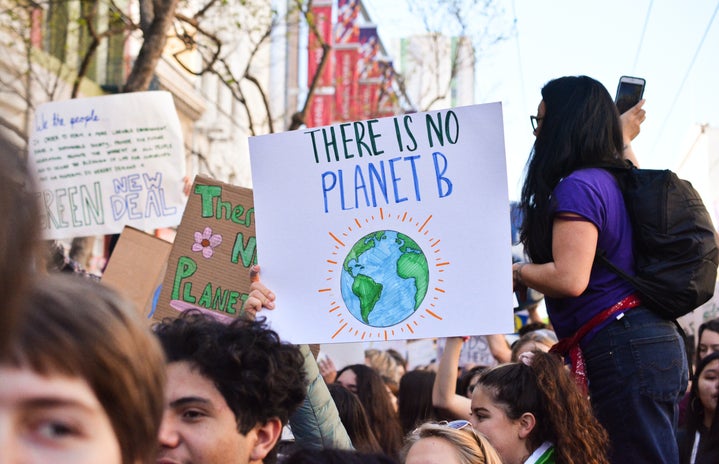Zoe Westhoff is a senior studying business administration with an emphasis on human resources management at MU. She has been a part of Sustain Mizzou, the sustainability club, since her freshman year at the Summer Welcome program, so almost five years. Westhoff answered a few questions about sustainability on Mizzou’s campus and how students can help the cause.
How does Mizzou approach sustainability?
Mizzou used to approach sustainability head on and was working towards admirable goals that genuinely benefited everyone associated with the University. In the past few years, Mizzou has stepped away from sustainability focused initiatives. After the composting program was defunded, the promise to divest from fossil fuels was rescinded and the Sustainability Office was defunded and closed, it looked as though the University was distancing themselves from progressing any further in sustainability initiatives. Sustain Mizzou has now absorbed the defunded sustainability office, which has brought back many of our past programs. We hope that having Sustain Mizzou become a funded program from the Student Sustainability Fee we helped pass back in 2009 can get the University to once again recognize the importance of sustainability programs and initiatives.
Compared to other colleges, how “green” is Mizzou?
Compared to many other colleges, Mizzou has been highly rated as a mostly sustainable University. The Sustainability Office was in charge of collecting these ratings through the Sustainability Tracking and Assessment Rating System (STARS). So, employees of the office were the ones grading the University on its sustainability. And yes, even though we rank highly, as a past employee, the rankings are set to a very low bar and many of the areas in which we checked the right boxes were questionable and open to interpretation. Now that the office is closed, this five year long assessment has been put on hold and will not be completed for this upcoming deadline. Now that the university is no longer tracking their waste and energy usage, along with the social, economic and environmental pillars of sustainability, it is hard to call MU a “green” university.
What is the biggest problem Mizzou faces when addressing sustainability?
The biggest problem we face is that for a university of this size, our recycling rates, waste reduction rates and education when it comes to sustainability are abysmal. We have so many resources and the ability to get so much done. With the defunding of sustainability programs over the past few years, the biggest problem we face is our own administration not taking this very important matter seriously.
What is something that Mizzou does that is positive relating to sustainability?
While they slack in some areas, Mizzou has been trying to make strides and accomplished a lot in the last few years. We have moved from using only 1% biomass in 2008 to 30% biomass in 2017. While this is not renewable energy, it is cleaner than coal. We also purchase renewable energy from wind and solar farms in other states. More information on the strides that Mizzou has made or had planned to make for 2017-2021 can be found on the Climate Action action plan, page 50.
What is something students can do to increase sustainability on campus?
What students can do is show administration how important social, economic and environmental sustainability is to our university. Adopting an eco-friendly lifestyle can sometimes be difficult in college, but it is not impossible. But more importantly, advocating for positive change in your community is the most effective thing you can do. If you are trying to recycle 100% properly but the university is throwing the recycling in the garbage, that doesn’t help. If you are trying to reduce your use of electricity and gasoline on a personal level, but the UM system has an estimated $10 million system-wide investment in the fossil fuel industry, that impact is much greater than yours. Personal strides in sustainability are important, and adapting a sustainable lifestyle to the best of your ability influences others in learning more and educating themselves on sustainability based topics. But to make the most change, get involved, join organizations dedicated to education and policy, advocate for change and hold the university accountable.
What are some of the main issues your club focuses on?
Sustain Mizzou is a 501(c)3 nonprofit, nonpartisan, student run organization focused on local action and education in our community. We help educate the students into understanding social, economic and environmental sustainability so they can make change within their world and their community. We do this through educational and fun meetings along with several projects that give students and community members first hand experience into sustainability related topics. We do beekeeping, stream cleans, food drives, clothing swaps, farmers markets, free bike repair, gameday recycling, compost and gardening and much more. We have been the biggest advocates for sustainability over the past 18 years and we will continue to advocate for our students and local community at the University of Missouri. As we transition into a full fledged program of the university, we will be working internally with administration to ensure that the students have a voice. We have no commitment requirements and welcome all students regardless of major. If you are interested in getting involved check them out on Engage!
What are the objectives and targets of your sustainability efforts, and what progress has been made in meeting your goals?
Mostly covered above, but we helped start recycling on campus, helped create the student sustainability fee in 2009 which led to the creation of the Sustainability Office. We diverted over an average of 17 tons of recycling from the landfill every football season. We helped start organizations like Coal Free Mizzou, the Energy Strategies Student Advisory Group (ESSAG), Environmental Leadership Office and many more. We used to divert more than 2,000 pounds of food waste a week from Rollins alone before the program lost funding and staff. We have brought back the program in hopes of picking it back up. Now, we have absorbed the Sustainability Office and will become a funded program of the University of Missouri. We have made exciting strides and will continue to make great progress every year.



